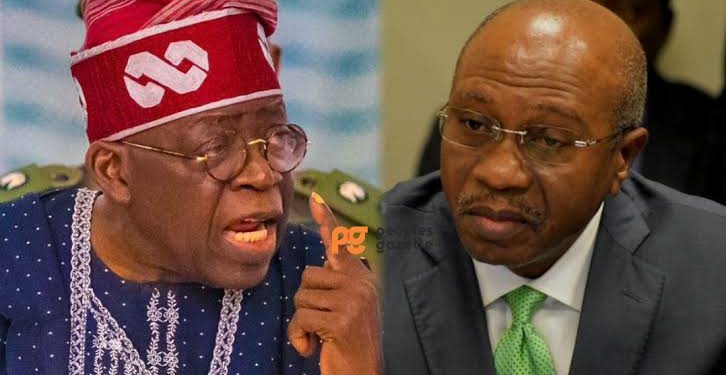President Bola Tinubu has taken the decision to suspend Mr Godwin Emefiele, the Governor of the Central Bank of Nigeria (CBN), with immediate effect. The decision comes as a result of the ongoing investigation into the affairs of Emefiele’s office and the planned reforms within the country’s financial sector. Willie Bassey, the Director of Information in the Office of the Secretary to the Government of the Federation, issued a statement on Friday providing details of the suspension.
As per the statement, Emefiele has been directed to hand over the reins of his office to the Deputy Governor (Operations Directorate), Mr Folashodun Adebisi Shonubi, who will serve as the acting CBN governor until the investigation and the subsequent reforms are concluded.
This is not the first time that Emefiele has found himself embroiled in controversy during his tenure as the head of the apex bank. In January 2023, he faced allegations of terrorism financing and economic crimes, resulting in attempted arrests by security operatives. These prior allegations may have played a role in the decision to suspend him while the ongoing investigation unfolds.
The power to remove the CBN governor rests with the President, in accordance with Section 11 of the CBN Act, 2007. However, such a decision must receive the support of a two-thirds majority in the Senate. The Act also specifies that individuals serving as lawmakers or directors of licensed banks under the Banks and Other Financial Institutions Act are ineligible to hold the positions of CBN governor, deputy governor, or director.
Furthermore, the CBN Act stipulates that criminal offenses and mental health conditions can lead to the termination of the CBN governor’s appointment.
President Tinubu’s decision to suspend the CBN governor reflects his commitment to implementing reforms that prioritize transparency, accountability, and efficiency within the financial sector. This bold move demonstrates the government’s determination to address corruption and improve governance in key institutions.
The suspension of the CBN governor carries significant implications for Nigeria’s financial sector. Emefiele, who assumed office on June 4, 2014, has been instrumental in shaping various policies and initiatives aimed at stabilizing and advancing the country’s economy.
As the investigation progresses and the reforms take shape, the appointment of an interim governor ensures stability during this transitional period. The outcome of the investigation and subsequent reforms will ultimately determine the future direction of the CBN and its role within Nigeria’s financial system. President Tinubu’s administration appears resolute in its commitment to fostering a more transparent and accountable financial sector, setting the stage for potential positive transformations in Nigeria’s economic landscape.











